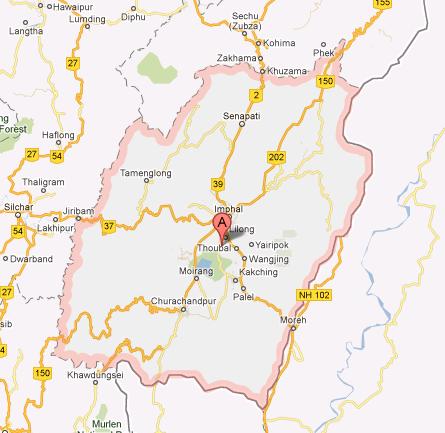Elections to Manipur’s 10th Legislative Assembly were conducted, in January-February 2012. The Indian National Congress [INC] swept the polls and sealed an absolute majority (42 seats out of 60) in the House. The outcome was applauded by the regional and national media as a hat-trick, performed by Mr Okram Ibobi Singh, the Chief Minister.

In fact, the results in Manipur came as a surprise, given that the law and order situation was precarious and was marked with uncertainty, frequent bomb-blasts and fierce encounters, necessitating the deployment of additional companies of paramilitary forces. In the wake of the precarious security scenario in Manipur and erratic functioning of the government, the media had, earlier, on a few occasions, described Manipur as a failed state under the same ruling party (INC). To make matters more difficult for the Ibobi Singh government, and his party, various underground militants groups unified against the INC by forming what is known as the Coordination-Committee (Cor-Com) –– an amalgam of seven valley-based militant groups. The elections were marked by numerous bomb-attacks targeting INC candidates and workers. The elections were, thus, conducted under the shadow of a high degree of violence perpetrated by the militant groups. In spite of this, the people of Manipur bravely exercised their franchise and voted the INC to power.
In the backdrop of the recent developments, it might be useful to consider what the elections in Manipur implied. First, regardless of the increased deployment of security forces during the elections, and thereafter, the security scenario in Manipur was volatile (and continues to remain so). For instance, several poll-related violent incidents were reported both in the Valley and Hill districts, including booth capturing at Mao Fudung village and Tadubi in Senapati district; dismantlement of electronic voting machines at Saluk and Unapat polling stations in Chandel and Ukhrul districts; and the death of seven people, including three polling officials, two Central Reserve Police Force (CRPF) personnel, a girl and a suspected National Socialist Council of Nagaland- Isak Muivah [NSCN (IM)] member in a crossfire at 41/40 Tampi polling station, under Chakpikarong Police Station limits, Chandel district.
Second, the 80 per cent voter turnout clearly mirrored the faith of the masses in democratic governance and the hope for improvement, even though the state was taken hostage by the militant groups that imposed economic blockade on National Highway No. 2 (erstwhile NH-39) for almost 100 days.
Third, it persuades one to suggest that the militants have lost their influence over the masses, which ought to have, otherwise, been under their direct influence, either because of ideological brainwashing or mortal threats. This became very clear when the people elected INC candidates despite numerous threats issued by the Cor-com warning the people not to support/ vote for the Congress candidates.
Fourth, the election also led to the emergence of a new political entity, which is suspected by the Valley people as inimical to the state’s interests. The Naga People’s Front (NPF) won four seats in the Naga dominated areas of the state. The NPF is seen by the Valley people as thriving chiefly because it espouses the Nagas’ demand for Nagalim. It is generally perceived as a potential challenge to the territorial integrity of the state as the proposed Nagalim includes four districts of Manipur, viz. Tamenglong, Senapati, Ukhrul and Chandel.
The continuing precarious security environment in Manipur has taken a toll on the economy of, and development in, Manipur. The finances of Manipur, like the other states of the North East region, are catered for through 90 per cent grant and 10 per cent loan from the Central Government. Even as the state is faced with an acute financial crunch, there has been a lack of industrial development and entrepreneurship. Only a few infrastructure projects are being undertaken, but these have, thus far, met with limited success. Besides, poverty in the state has increased in the last few years. According to the 2011 Census figures, the state has a population of 12.5 lakh below the poverty line (BPL); the population of Manipur is 27.21 lakh. Thus, poverty in Manipur is the highest in the northeast region with 45.93 per cent people falling under the BPL category.
Even as the overall situation in Manipur presents a rather depressing picture, the people have not given up hope. They earnestly aspire that the Central and State governments would resolve various issues that have been plaguing the state. Of course, there are some doubts in the minds of the people, which nudge them to wonder if there would be a drastic change in the state of affairs, all the more because the same political party has strode to power for a third consecutive term.
But, it is with the hope of a better future that the people voted the INC back to power. The Ibobi dispensation would do well to understand that the people have reiterated their faith in democracy and have cold shouldered the militants, if not politely shown them the door. Consequently, it is the responsibility of the INC government to take advantage of the situation and not let down the people of Manipur. It has to rise up to the occasion and fulfil their aspirations. It cannot afford to squander the opportunity afforded to it by the people.
** Article was orginally published on April 16, 2012
**Originally published by Institute for Defence Studies and Analyses (www.idsa.in) at [http://idsa.in/idsacomments/ManipurPostAssemblyElections2012_ShrishtiPukhrem_160412]



